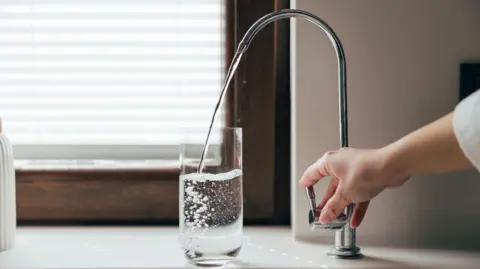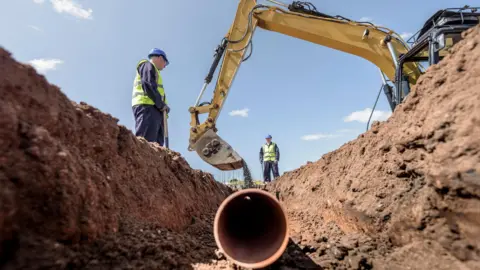Rates increase of £100 could 'solve NI's water crisis'
 Getty Images
Getty ImagesA £100 increase in the average household rates bill could largely solve Northern Ireland's water infrastructure crisis, a new report has suggested.
The study was commissioned by the bodies representing the construction industry, housing associations and the NI Chamber of Commerce.
The increased rates payments would be accompanied by borrowing by NI Water.
Persistent underfunding of NI Water has led to a shortfall in wastewater infrastructure, which in turn, is limiting house building and contributing to water pollution.
NI Chamber chief executive Suzanne Wylie told Good Morning Ulster the £100 increase suggested in the report is an "average figure" meaning some properties would pay less and some would pay more.
 Getty Images
Getty ImagesNorthern Ireland is the only part of the UK where households do not pay directly for their water.
Instead, NI Water receives a government subsidy which diverts more than £300m annually from the Stormont Executive's budget.
Rates are a property tax levied on households and businesses and are the main tool which the Executive can use to raise money.
Households previously paid for water through a portion of their rates bill but that link was broken in 1998.
The report suggests essentially recreating that link through an infrastructure levy.
It said: "This retains public ownership of NI Water, supports long-term strategic investment and minimises pressure on the NI Executive's budget."
It added that the levy could be decreased once NI Water's investment backlog is cleared.
In response to the rates proposal, a Department for Infrastructure spokesperson said the minister was willing to consider alternative approaches but did not want to add to the "financial burden" of the public.
They added that Liz Kimmins was "very aware of the challenging financial circumstances of many people across our society".
Water infrastructure challenges
Ms Wylie said there was a "huge problem" with the level of infrastructure in Northern Ireland, meaning there were not enough connections to build new homes, factories or extensions to workplaces.
She said increasing rates wouldn't be an "easy choice" but added that Kimmins was "open to ideas and solutions".
"Revenue raising needs to be part of the answer and we've tried to look at a low cost solution in report," Ms Wylie added.
The Executive parties are opposed to water charges and also generally try to keep rates increases at about the rate of inflation.
The Sinn Féin-controlled Department for Infrastructure is holding a consultation which could lead to all house builders in Northern Ireland having to pay into a wastewater infrastructure fund.
Kimmins has set out a second proposal which would involve voluntary contributions from developers.
She said developer payments alone would not solve the problems but would be a "step forward on the journey towards having the infrastructure we all need".
A consultation on those proposals closes on Friday.
Mark Spence, chief executive of the Construction Employers Federation (CEF), said there could be "a jigsaw of different solutions".
"NI Water is significantly underfunded by comparison to water companies in England which equally are struggling," he said.
Mr Spence added that there was "no perfect model"– but he said there was no model which did not "require additional contributions from the public".
He said the CEF would support voluntary developer contributions but it was against mandatory.
Last week a budget watchdog, the NI Fiscal Council, warned that a developer levy would not raise a significant amount of money.
"It could help at the margin, but it is not as much of a gamechanger as something bigger on regional rates or domestic charging," its chairman Sir Robert Chote said.
